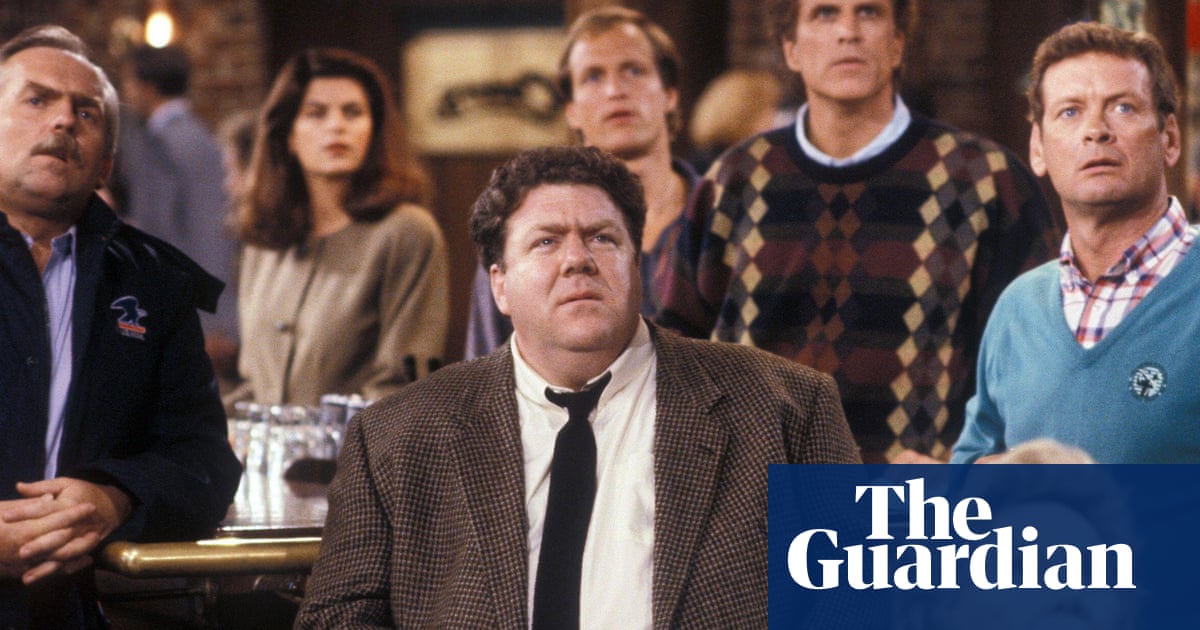George Wendt, who has died aged 76, made his name in the American sitcom Cheers as the popular, beer-guzzling Norm Peterson. He appeared in all 275 episodes of the series, which ran from 1982 to 1993, starred Ted Danson as the Cheers bar owner, Sam Malone, and gained a worldwide following.
His character’s arrival was a running gag. He would swing through the doors, bidding the regulars a good evening (or afternoon), and they would yell back in unison: “Norm!” It chimed with the lyrics from the programme’s theme song: “Sometimes you want to go where everybody knows your name.”
Wendt was instrumental in developing the character, who was never intended as a regular cast member – and began with a different name. As George in the original script of the opening episode, he was the Boston bar’s first customer, with just one line: “Beer!”
Wendt recalled: “My agent said, ‘It’s a small role, honey. It’s one line. Actually, it’s one word.’” But the producers saw the actor’s potential and expanded the role into that of an unemployed accountant, with the name change to Norm. Later in the series he became a painter and decorator.
Les Charles, who created Cheers with his brother Glen and the programme’s director, James Burrows, said he based him on someone he had encountered while working behind a bar as a student. Norm had a loyal drinking buddy, Cliff Clavin (John Ratzenberger), a know-it-all postal worker.
Shelley Long also starred, as Diane Chambers, who works behind the bar – a university graduate in an on-off “uptown-downtown” relationship with Sam – and she welcomes Wendt’s character with the more refined greeting “Norman”; while Rhea Perlman played the waitress Carla Tortelli.
They were later joined by Woody Harrelson as the bartender Woody Boyd, following the death of Nicholas Colasanto (who played Coach), Kelsey Grammer as the psychiatrist Dr Frasier Crane andKirstie Alleyas Rebecca Howe, who replaced Long in 1987.
The sitcom was initially a slow-burner. Audience ratings were low, but praise from TV critics and five Primetime Emmy awards in 1983 helped to keep it going. “The tipping point was the beginning of season three,” said Wendt, adding with an air of mock cynicism: “We were behind The Cosby Show in the lineup [schedule], and I guess people were too lazy to change the channel.”
In all, Cheers won 28 Emmy awards over its 11 series and attracted a staggering audience of 93 million in the US – 40% of TV viewers – for its final episode in 1993. Wendt was nominated for six Emmy awards as outstanding supporting actor in a comedy series.
Wendt reprised the character in an episode of St Elsewhere (1985) and the Cheers spin-offs The Tortellis (1987) andFrasier(2002), as well as voicing him in the Simpsons (1994) and Family Guy (2007 and 2009) cartoons.
Born inChicago, he was one of the nine children of Loretta (nee Howard), a hospital volunteer with ancestors from County Mayo, Ireland, and George Wendt Sr, who owned a real estate agency.
His maternal grandfather, Tom Howard, was a photographer who took ahistoric 1928 newspaper picture of the convicted murderer Ruth Snyder in the electric chairas the switch was thrown, which appeared on the front page of the New York Daily News.
Wendt attended Campion high, a Jesuit boarding school in Wisconsin, but was then expelled from the University of Notre Dame – he said he moved off campus without transport and missed classes – before graduating in economics from Rockhurst College, Kansas City, Missouri, in 1971.
Wanting to perform, he returned to Chicago, took acting classes and joined the Second City comedy improvisation troupe (1974-80).
Then came roles in Hart to Hart, Taxi and the soap opera spoof Soap (all 1981) and MAS*H (1982), as well as Airplane II: The Sequel (1982), playing a ticket agent.
Fame from Cheers brought Wendt the role of Macaulay Culkin’s grumpy father in the opening sequence for Michael Jackson’s Black Or White pop video (1991).
His own sitcom, The George Wendt Show (1995), with him playing the joint owner of a Wisconsin garage who hosts a radio phone-in about car repairs, flopped. More happily, he had runs in The Naked Truth (1997) as Les Polanski, a meatball mogul buying a tabloid newspaper with the aim of making it “respectable”, and Sabrina, the Teenage Witch (2001-02) as Mike Shelby, the cynical editor-in-chief of the Boston Citizen.
Wendt was seen in the Spice Girls’ movie Spice World (1997) as a film producer and landed guest spots in television programmes such as Saturday Night Live (between 1991 and 2003).
His post-Cheers career also brought success on theBroadwaystage. He played Yvan, caught in the middle of the conflict between three friends, in the Yasmina Reza comedy Art (Royale theatre, 1998-99); the plus-sized laundress Edna Turnblad, invariably acted by a man in drag, in the musical adaptation of Hairspray (Neil Simon theatre, 2007-08); Santa in the musical Elf (Al Hirschfeld theatre, 2010-11); and the bar owner Joe Bell in Breakfast at Tiffany’s (Cort theatre, 2013).
With Jonathan Grotenstein, he wrote the book Drinking With George: A Barstool Professional’s Guide to Beer (2009).
In 1978 Wendt married the actor Bernadette Birkett, whom he had met at Second City and was occasionally heard – but not seen – as Norm’s wife, Vera, in Cheers.
She survives him, along with their children, Hilary, Joe and Daniel, his stepchildren, Joshua and Andrew, one grandchild, and his siblings Kathy, Nancy, Loretta, Marti and Paul.
George Robert Wendt, actor, born 17 October 1948; died 20 May 2025
